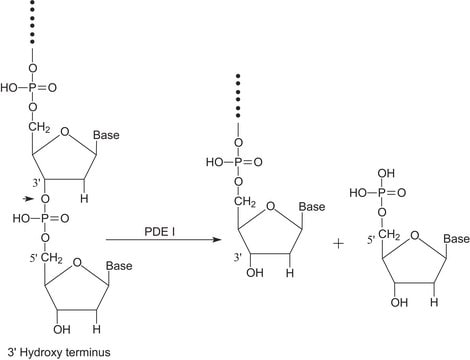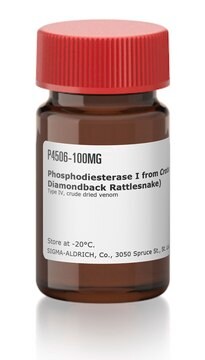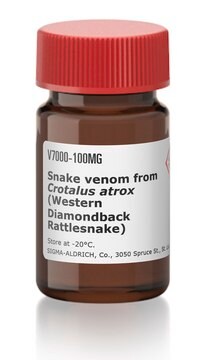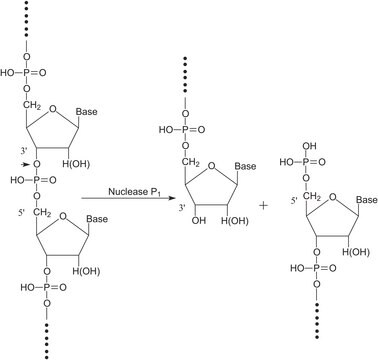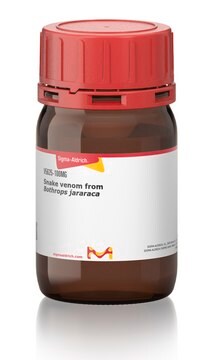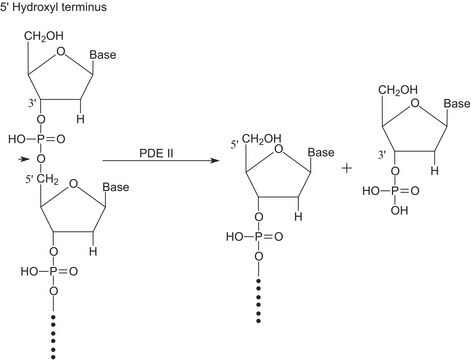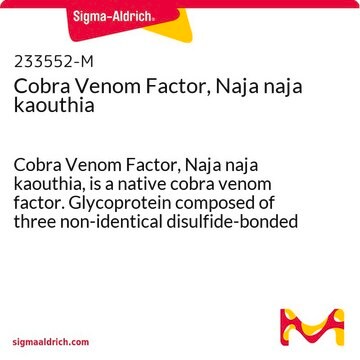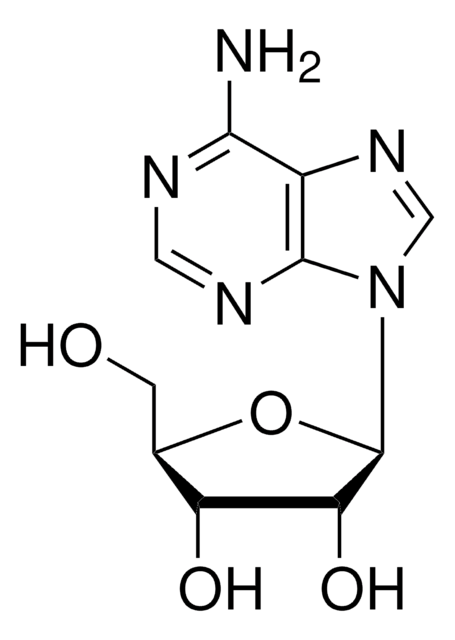P3134
Phosphodiesterase I from Crotalus adamanteus venom
Type VI, crude dried venom
Sinônimo(s):
5′-Exonuclease, Oligonucleate 5′-nucleotidohydrolase
Faça loginpara ver os preços organizacionais e de contrato
About This Item
Produtos recomendados
Procurando produtos similares? Visita Guia de comparação de produtos
Descrição geral
Research area: Cell signaling. PhosphodiesteraseI (PDEI) exists in three isoforms PDE1A, PDE1B, and PDE1C(2) are localized to the central nervous system, cardiovascular, and other organs.
Aplicação
Phosphodiesterase I from Crotalus adamanteus venom has been used:
- for cleaving the 3′-5′ internucleotide bonds in the linear chains of the RNA oligomers
- as a model for the hydrolysis of prodrugs in phosphodiesterase assay
- as a component in the nucleotide cleavage buffer
Ações bioquímicas/fisiológicas
Phosphodiesterase I breaks phosphodiester bonds and catalyzes the hydrolysis of various nucleotide polyphosphates. Phosphodiesterase I is released from eucaryotic plasma membranes by phosphatidylinositol-specific phospholipase C. PhosphodiesteraseI (PDEI) can hydrolyze 3′,5′-cyclic adenosine monophosphate (cAMP) and3′,5′-cyclic guanosine monophosphate (cGMP). It binds to Ca2+/calmodulin(CaM) that lead to the stimulation of its catalytic activity.PDEIacts as a biotherapeutic for the treatment of cancer, heart diseases,pulmonary, metabolic, neurocognitive, renal, endocrine abnormalities, andneurological disorders.
Inibidor
substrato
Nº do produto
Descrição
Preços
Palavra indicadora
Danger
Frases de perigo
Declarações de precaução
Classificações de perigo
Resp. Sens. 1
Código de classe de armazenamento
11 - Combustible Solids
Classe de risco de água (WGK)
WGK 1
Ponto de fulgor (°F)
Not applicable
Ponto de fulgor (°C)
Not applicable
Escolha uma das versões mais recentes:
Já possui este produto?
Encontre a documentação dos produtos que você adquiriu recentemente na biblioteca de documentos.
Os clientes também visualizaram
Chemical toxicity testing in vitro using cytochrome P450--expressing cell lines, such as human CYP1B1
Landsiedel R, et al.
Nature Protocols, 6(5), 677-677 (2011)
Formation of RNA oligonucleotides over the mineral surface preliminary irradiated with UV light
Otroshchenko VA and Vasilyeva NV
Reaction Kinetics and Catalysis Letters, 97(1), 151-156 (2009)
Anatoly I Dragan et al.
Nucleic acids research, 32(17), 5192-5197 (2004-10-02)
The interaction of proteins with DNA results, in some cases, in DNA bending, and this might have functional importance. However, when the protein-induced bending of DNA is small, its measurement presents a problem. It is shown that the fluorescence resonance
Ester prodrugs of acyclic nucleoside thiophosphonates compared to phosphonates: synthesis, antiviral activity and decomposition study
Roux L, et al.
European Journal of Medicinal Chemistry, 63, 869-881 (2013)
Suxiang Chen et al.
Scientific reports, 9(1), 6078-6078 (2019-04-17)
Antisense oligonucleotide (AO)-mediated splice modulation has been established as a therapeutic approach for tackling genetic diseases. Recently, Exondys51, a drug that aims to correct splicing defects in the dystrophin gene was approved by the US Food and Drug Administration (FDA)
Nossa equipe de cientistas tem experiência em todas as áreas de pesquisa, incluindo Life Sciences, ciência de materiais, síntese química, cromatografia, química analítica e muitas outras.
Entre em contato com a assistência técnica